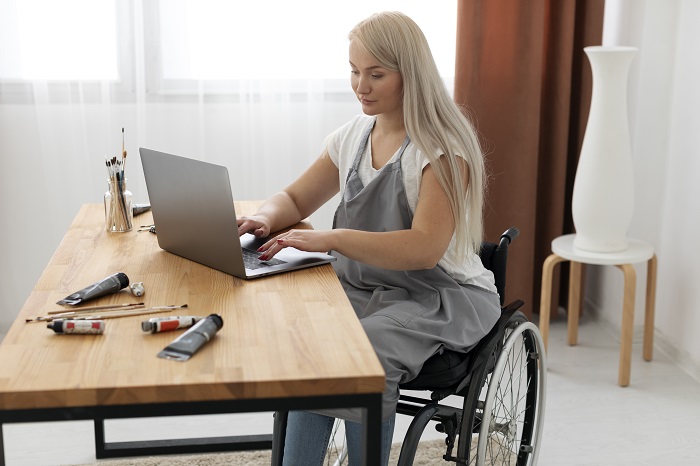Returning to manage your small business after experiencing reduced mobility can be a challenging yet rewarding process. This article aims to provide practical advice and strategies to help you navigate this transition smoothly, ensuring both your personal well-being and the continued success of your enterprise.
Reassess Your Workplace Setup
The first step in returning to your business is to reassess your workplace setup. Your office or shop may need modifications to accommodate your new mobility needs. Start by conducting an accessibility audit of your premises. Look for potential barriers such as steps, narrow doorways, or high counters that might hinder your movement.
Think about talking to an occupational therapist or an accessibility specialist. These professionals can provide tailored advice on how to modify your workspace effectively. The Access to Work scheme, provided by the Department for Work and Pensions, can offer practical support and even financial assistance for workplace adaptations.
Simple changes can make a significant difference. Installing ramps, widening doorways, or rearranging furniture to create clear pathways can greatly improve accessibility. Don’t forget to consider the height of desks, counters, and shelving units to ensure they’re comfortable and accessible from a seated position if necessary.
Embrace Technology and Remote Working
Technology can be a powerful ally in managing your business with reduced mobility. Embrace digital tools that allow you to work more flexibly. Video conferencing platforms like Zoom or Microsoft Teams can enable you to conduct meetings from home when travelling to the office is challenging.
Cloud-based software solutions can provide access to your business data and systems from anywhere, allowing you to manage operations remotely when needed. Many UK-based service providers offer secure, GDPR-compliant solutions tailored for small businesses.
Consider implementing a hybrid working model for yourself and your employees. This approach, which combines remote and in-office work, has become increasingly common in the UK. It can provide you with the flexibility to manage your health needs while maintaining a presence in the office.
Delegate and Restructure Responsibilities
Returning to your business might require a restructuring of roles and responsibilities. Be honest with yourself about tasks you may no longer be able to perform easily. Delegating these responsibilities to trusted employees or outsourcing to contractors can help ensure your business runs smoothly.
This transition can be an opportunity to empower your team and develop their skills. Consider providing additional training to employees who will be taking on new responsibilities. The UK government’s National Skills Fund offers various training opportunities that could benefit your staff.
Remember, effective delegation doesn’t mean losing control of your business. Instead, it allows you to focus your energy on strategic decision-making and areas where your expertise is most valuable.
Mobility Scooters Can Be A Game-Changer
For many small business owners with reduced mobility, mobility scooters can indeed be a game-changer. These devices can significantly extend your range of movement, allowing you to navigate your business premises and even travel short distances outside with greater ease and independence.
Modern mobility scooters come in various sizes and styles to suit different needs and environments. For example, some are designed for outdoor use, with features like larger wheels and longer battery life, which could be beneficial if your business requires you to travel locally. You can find a great range of mobility scooters for sale at Mobility Solutions, which has years of experience and locations around the country.
Prioritise Self-Care and Time Management
Managing a business while dealing with reduced mobility can be physically and emotionally demanding. It’s crucial to prioritise self-care and effective time management to prevent burnout and maintain your health.
Consider working with a physiotherapist or occupational therapist to develop a routine that balances your work responsibilities with necessary rest and physical therapy. The NHS offers various support services, including physiotherapy, which you can access through your GP.
Effective time management becomes even more critical when dealing with reduced mobility. Use digital tools like calendar apps and task management software to organise your day efficiently. Build in extra time for tasks that may now take longer to complete, and don’t hesitate to schedule rest periods throughout your workday.
Communicate Openly with Clients and Employees
Open communication with your clients and employees about your changed circumstances is crucial. Be honest about any limitations you may have, but also emphasise your continued commitment to the business and its services.
Focus on how you’re adapting your business to maintain or even improve service quality when you’re talking to clients. Explain any changes to how you’ll interact with them explain these clearly. Most clients will appreciate your transparency and may even offer support or understanding during your transition.
Discuss any changes to the business structure or roles with your employees. Encourage an open dialogue where they can express any concerns or ideas they might have. This inclusive approach can foster a supportive work environment and may lead to innovative solutions you hadn’t considered.




